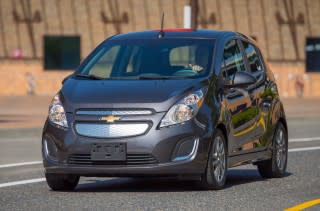LG Chem To Become World's Biggest Electric-Car Battery Supplier? Could Be, Report Says
Three major companies compete today to supply the lithium-ion cells that make up the bulk of today's electric-car battery market.
Panasonic sells primarily to Tesla Motors, while AESC is a joint venture half owned by Nissan.
Then there's LG Chem, which sells lithium-ion batteries to quite a number of different car manufacturers.
DON'T MISS: Why LG Chem Leads In Electric-Car Batteries: Materials Science, It Says
That could allow the Korean company to surpass its rivals in the electric-car battery business eventually, according to a new report from Lux Research (via Charged EVs).
The research firm believes Panasonic is the current leader, with a 39-percent market share.
It also suggests that the Japanese company may expand its share to 51 percent between now and 2020--or maybe not.

The report claims Panasonic's reliance on Tesla as its main outlet for automotive lithium-ion cells may ultimately prove to be a disadvantage.
While both Panasonic and AESC have a high total output of electric-car batteries so far, LG Chem cells can be found in a much wider array of cars.
They are currently used in vehicles from Audi, Chevrolet, Ford, Hyundai, Renault, Smart, Volkswagen, Volvo, and others.
MORE: Battery Maker LG Chem: Biggest Electric-Car Winner Of All? (Aug 2014)
LG Chem is also expected to supply cells for the 2017 Chevrolet Bolt EV--a 200-mile electric car that will sell for $37,500, before incentives.
Meanwhile, Panasonic will oversee cell production at Tesla's Nevada "Gigafactory" that will supply batteries for the carmaker's 200-mile, $35,000 Model 3, as well as for its line of home energy-storage products.

 Yahoo Autos
Yahoo Autos 
